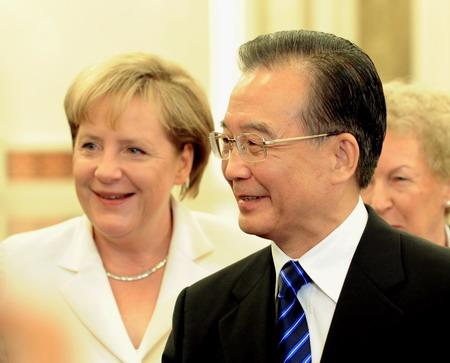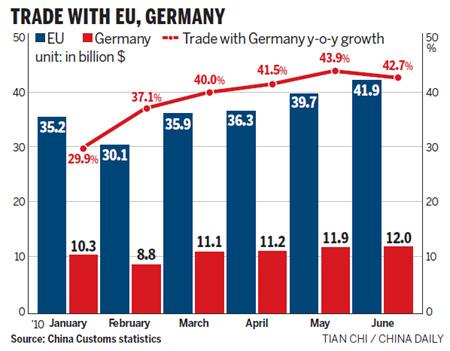
Premier Wen Jiabao welcomes visiting German Chancellor Angela Merkel at the Great Hall of the People in Beijing on Friday. [Wu Zhiyi / China Daily]
Stimulating domestic demand to continue, Wen saysBEIJING - China will continue to seek balance instead of surplus in trade and it will oppose any form of protectionism along with Germany, Chinese Premier Wen Jiabao said on Friday.
These efforts should be praised and not criticized, particularly when compared with any major country that claims to double its exports to alleviate unemployment pressure, Wen said at a joint news conference with visiting German Chancellor Angela Merkel.
Wen made the remarks amid growing concerns that China's export growth would gradually drop despite the strong momentum in June.
China's exports for June was at their highest level since July 2008 and total trade surplus in the first half reached $55.3 billion, but economists said such strong momentum cannot be sustained in the next half.
Li Daokui, an economist at Tsinghua University and a member of the central bank's monetary policy committee, told China Daily that he expected surplus for the whole year to be about $100 billion. Its proportion to the country's GDP may fall further to less than 2 percent from 4 percent in 2009 and 8 percent in 2008 by the end of this year, Li said.
"That is huge progress for the country's economic restructuring, which makes the economy more domestic consumption-oriented instead of export-driven," he said in an earlier interview, adding that the country's balance of international payment will be "more reasonable".
China will continue to stimulate domestic demand as well as stick to an appropriately loose monetary stance and pro-active fiscal policy, Wen said. Policy stability will be the government's economic priority in the second half of this year, he said.

His remarks came one day after China reported a slowdown in growth in the second quarter, which was attributable to a tightening of the real estate sector and the control of credit as policymakers worried about economic overheating early this year.
China's GDP growth slowed to 10.3 percent in the second quarter from 11.9 percent in the first three months of the year, the National Bureau of Statistics reported on Thursday.
The country will also keep faith with the euro despite Europe's debt problems, Wen said.
"China is a responsible, long-term investor that has always pursued the principle of diversifying its investment. The European market has been, is and will be one of the main investment markets for China's foreign exchange reserves," he said.
China does not disclose the currency composition of its $2.45 trillion foreign exchange reserves, the world's largest. Analysts estimated that two-thirds of the money is in dollar assets, with a major part of the remainder going to euros.
The country should make more diversified investments with the reserves to counter trade protectionism, especially from the United States, said Zhang Monan, an economist with the State Information Center.





